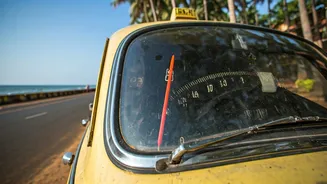The Goa Taxi Trap
Many travelers visiting Goa encounter a common problem: expensive taxi fares. Often, tourists find themselves paying significantly more than they should
for short trips. This situation can put a damper on the overall travel experience, making it feel less enjoyable and potentially straining budgets. The issue has become so prevalent that it's a regular topic of discussion among visitors, shared across various online platforms and travel forums. Travelers' experiences consistently point towards a pattern of inflated charges, which is a key factor impacting many people's impression of Goa as a travel destination. The high fares also lead to a feeling of being taken advantage of, making it difficult for tourists to fully immerse themselves in the local culture and relax.
A Bengaluru's Solution
A person from Bengaluru shared an approach that may help visitors potentially lower taxi fares in Goa. This 'cheat code' doesn't involve any sophisticated tricks; instead, it relies on straightforward communication and a specific phrase. The advice suggests that by using a particular statement at the start of a taxi journey, travelers may be able to influence the fare negotiation in their favor. The shared tip resonated widely online, sparking conversations among people who had similar issues during their trips. The simple act of sharing this piece of information highlights the widespread nature of the issue. The public interest in the tip reflects a need for solutions to navigate Goa’s taxi situation.
How It Works
The method involves telling the driver the intended destination before the journey begins. It's about setting a precedent and initiating the negotiation with a clear understanding of the route. This proactive communication might give the traveler a better position. It also means you have a solid basis for any future fare discussions. Some users suggest it can create a more open environment for agreeing on a fair price from the start. Although it is not guaranteed to work every time, this initial step could set a foundation that may help in avoiding exorbitant charges.
Internet Weighs In
The online community has been actively discussing and analyzing the topic. This is done on travel forums, social media, and other digital platforms. People are sharing their experiences, which range from frustrating encounters to successful fare negotiations. These discussions also feature alternative transportation options and suggestions for how to deal with drivers who quote high prices. It’s also leading to the sharing of various negotiation techniques. The collective effort highlights a shared frustration among visitors. It also displays the desire to find solutions that offer travelers a better, more budget-friendly experience. The internet has become a valuable resource for those planning their trips to Goa, and are looking for advice from people who have been there before.
Beyond the Tip
While the tip provides a potential solution, it’s also important to consider wider strategies for managing transportation costs in Goa. One approach is to explore alternative modes of transport such as renting scooters or using ride-sharing apps, where available, to cut down on expenses. Bargaining respectfully and being aware of the typical rates for different distances is also crucial. Also, before commencing the ride, confirm the price with the driver, clarifying the mode of payment to avoid misunderstandings later. Also, it’s worth checking whether the destination is easily reachable by alternative public transportation.
Final Thoughts
Dealing with taxi fares in Goa does not have to be a source of stress. Armed with information and a little bit of strategic action, visitors can potentially have better experiences. By using the 'cheat code' tip and other techniques to compare rates, travelers can potentially enjoy their time in Goa without breaking the bank on transportation. While a single piece of advice is not a silver bullet, it represents a step towards a more informed and empowered travel experience. It also encourages travelers to share their personal insights, thus building a more community-focused approach to travel planning.














